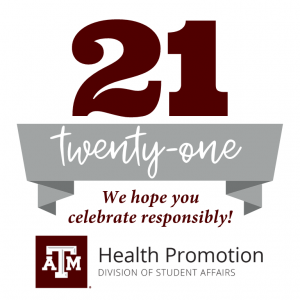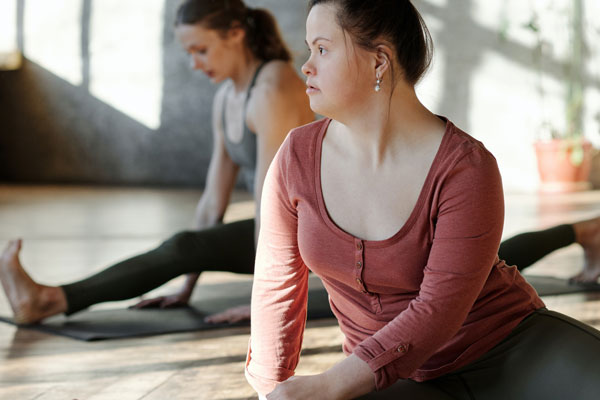PROGRAMS, SERVICES & EVENTS
Health Promotion offers several programs, services and campus events that stem across a variety of topics. For workshops and presentations, visit our Presentations page.

ALCOHOL &
OTHER DRUGS
On August 3rd, 1999, the Aggie Community lost one of its members to alcohol poisoning on his 21st birthday. Click the title for a message sent to all Texas A&M University students for their 21st Birthday as an encouragement to celebrate this landmark, but to do so in a safe and responsible way.
Didn't receive your 21st Birthday email? We apologize for the error! Email healthpromotion@tamu.edu and we'll send it right away.
A message from Aggie parents:
"On August 3rd, 1999 we lost our Aggie son on his 21st birthday to alcohol poisoning. He was a senior and had his whole life ahead of him. It all went away in one night. Michael was not an alcoholic, nor did he abuse alcohol. It was just one night of celebratory drinking that killed him. That’s all it takes. We wouldn’t want this to happen to you. Please take time to educate yourself and others about responsible alcohol use, and make good decisions. We wish you the very best 21st birthday. Make it one to remember."
-Bodie and Susan Wagener, In memory of Michael, Class of 2000

5 in 2 is a binge-drinking campaign inspired by the LessThanUThink Campaign at the University of Alabama. This campaign aims to educate students on the definition of binge-drinking and the negative social and physical consequences. 5 in 2 events are held throughout the year.
This 2-hour workshop teaches the basics of alcohol use and how to keep yourself and others safe around alcohol. We cover many topics, including standard drink sizes, alcohol absorption factors, blood alcohol concentration, binge-drinking, caring for intoxicated individuals, alcohol poisoning, and consequences (professional, academic, legal). This workshop is regularly offered to students who need to fulfill Student Conduct Office sanctions, but any Texas A&M student is encouraged to attend if they would like to. Come prepared to discuss issues surrounding alcohol on college campuses. To sign up for this workshop, please visit our Sanction Intake Form. For individuals only; not for group requests.
Brief Alcohol Screening Intervention for College Students (BASICS) is an individual interview process conducted over two 90-minute meetings designed to discuss a student's drinking habits and assist the student in making informed decisions regarding their alcohol consumption. More information can found on our BASICS page.
Marijuana 101 is a two-part online course that helps students assess their cannabis use and understand cannabis’ effects. While Marijuana 101 is sometimes mandatory for students who violate Texas A&M’s student rules, the course can be taken by any student who wishes to assess their cannabis use and learn more about how cannabis works and the effects it can have. More information can be found on our Marijuana 101 page.
Every September, SAMHSA sponsors Recovery Month to increase awareness and understanding of mental and substance use disorders and celebrate the people who recover. Health Promotion puts together a calendar of events every year for National Recovery Month. More information at recoverymonth.gov.
Health Promotion provides SMART Recovery meetings, the Aggie Sober Tailgate, and programming and education for National Recovery Month! More information as well as recovery resources can be found on our Recovery Services page.
Run for Recovery is a 5K cohosted by Health Promotion and Intramural Sports within Rec Sports. This event is focused on raising awareness of recovery and raising funds to support programming.
SMART Recovery is a science-based program to help people manage their recovery from addictive behavior. SMART stands for Self-Management And Recovery Training. SMART Recovery helps participants decide if they have a problem, builds their motivation to change, and offers a set of proven tools and techniques to support recovery. Our program isn’t intended to be a substitute for professional help or treatment. SMART Recovery encourages individuals to determine a recovery path that is right for their needs and beliefs. Some may choose to use the program in concert with other mutual-support groups, or in conjunction with professional treatment. SMART Recovery recognizes there are many pathways to recovery.

INTERPERSONAL VIOLENCE
PREVENTION
October is recognized as Domestic Violence Prevention and Awareness Month. During this month, Health Promotion in Student Life schedules several events and workshops with campus and community partners to bring awareness to the prevalence of both dating and domestic violence in our communities, educate our campus on the signs of abuse, demonstrate different ways that bystanders can help to prevent violence, and provide information on effective ways to support victims and survivors.
Dating and domestic violence consist of behaviors used to maintain power and control over a current or former intimate partner. There are several types of dating and domestic violence, including but not limited to physical abuse, sexual abuse, emotional abuse, financial abuse, digital (online) abuse, and stalking. At the 2019 New Student Conferences, 65% of incoming freshmen indicated (through anonymous polling) that they had experienced relationship violence or knew someone who had (N=7,751). Here at Texas A&M University, 16.8% of female undergraduate students, 10.3% of male undergraduate students, and 10.4% of transgender, genderqueer, nonconforming, or questioning (TGQN) undergraduate students who were in partnered relationships and participated in a recent survey stated that they had experienced intimate partner violence (AAU Survey on Sexual Assault and Misconduct, 2019; N=1,994). Dating and domestic violence impact individuals across the lifespan and anyone can experience this crime regardless of their identity. For more evidence-based information on dating and domestic violence, we recommend starting with the Centers for Disease Control and Prevention.
If you are a victim or survivor of domestic violence, help is available 24 hours a day, seven days a week through the National Domestic Violence Hotline, 1−800−799−SAFE (7233). If you would like additional information on both confidential and non-confidential resources on the Texas A&M campus and in the Bryan/College Station communities, please contact our office at healthpromotion@tamu.edu.
Green Dot is a national bystander intervention program that teaches students, faculty, and staff how to intervene safely and appropriately in situations where acts of power-based personal violence are witnessed. You can learn more by requesting a virtual overview or training for your student organization, department, or classroom.
January is recognized as National Stalking Prevention and Awareness Month. During this month, Health Promotion in Student Life host interactive events that bring awareness to the prevalence of stalking in our communities, educate our campus on the signs of stalking, demonstrate different ways that bystanders can help to prevent violence, and provide information on effective ways to support victims and survivors.
Stalking occurs when someone repeatedly harasses or threatens another person to the point of causing fear or safety concerns. It is estimated that over 25 million Americans have experienced at least one form of stalking in their lifetime. At Texas A&M, 19.4% of students who participated in a recent survey indicated that they had experienced at least one type of stalking behavior since enrolling at the university (AAU Survey on Sexual Assault and Misconduct, 2019; N=3,140). Stalking impacts individuals across the lifespan and anyone can experience this crime regardless of their identity. The majority of stalking victims/survivors are stalked by someone they know; most often, the offender is a current or former intimate partner.
If you are a victim or survivor of stalking, help is available 24 hours a day, seven days a week through the Victim Connect Hotline, 1−855-4-VICTIM (842846). If you would like additional information on both confidential and non-confidential resources on the Texas A&M campus and in the Bryan/College Station communities, please contact our office at healthpromotion@tamu.edu.
April is recognized as Sexual Assault Prevention and Awareness Month. During this month, Health Promotion strives to educate our campus community about the warning signs of sexual violence, how to stop potential acts of violence from occurring, and how to support those who have been impacted by sexual violence.
Sexual violence can include sexual harassment, sexual assault (rape, fondling, incest, and statutory rape), and sexual exploitation. It can occur as a singular crime or in tandem with other types of physical and non-physical violence. Anyone, regardless of their identity, can experience sexual violence. In at least 80 percent of reported cases, the perpetrator is known to the victim/survivor. Here at Texas A&M University, 14.1% of female undergraduate students, 4% of male undergraduate students, and 5.3% of transgender, genderqueer, nonconforming, or questioning (TGQN) undergraduate students who participated in a recent survey stated that they had experienced penetration by physical force or inability to consent (AAU Survey on Sexual Assault and Misconduct, 2019; N=2,607). For more evidence-based information on stalking, we recommend starting with the Centers for Disease Control and Prevention.
If you are a victim or survivor of sexual violence, help is available 24 hours a day, seven days a week through the National Sexual Assault Hotline (1-800-656-4673). You may also reach out to the Sexual Assault Resource Center of Brazos Valley 24/7 at 979-731-1000. If you would like additional information on both confidential and non-confidential resources on the Texas A&M campus and in the Bryan/College Station communities, please contact our office at healthpromotion@tamu.edu.
The Silent Witness Project is Texas A&M University's traveling memorial to victims of dating and domestic violence. Student Life has hosted this exhibit since 2004 in order to increase awareness and education about how these issues impact our state and local communities.
The Silent Witness exhibit contains 10 red, life-sized silhouettes, each representing a victim who lost their life through an act of dating or domestic violence. Each silhouette includes a shield with a summary about the victim.
Texas A&M's Silent Witness Project is part of the Silent Witness National Initiative, whose goal is to eliminate domestic violence-related homicides in the United States. Find out more about the National Initiative.
The STAND Up workshop is designed to assist individuals in learning positive and helpful ways to have conversations with those who have been involved in a traumatic event. The workshop provides information about sexual assault, dating violence, domestic violence, and stalking; social perspectives; the impacts of trauma on the brain; listening techniques; tools for mandated reporters; and campus and community resources. You can learn more by attending a free training on campus, or by requesting a training for your student organization, department, or classroom.

GENERAL WELLNESS
Have questions about a particular health topic? Looking for help in how to apply healthy behaviors while in college or living on campus? Schedule a time to meet with a staff member and discuss issues related to your health by calling 979.845.0280 or emailing healthpromotion@tamu.edu.
The American College Health Association’s National College Health Assessment (NCHA) is a nationally recognized research survey that allows us to learn about students’ health. The information you provide directly impacts how we devote our resources to support your academic achievement and personal development throughout your time in Aggieland. The NCHA is one of the strongest ways students can influence health promotion on campus. For more information about the NCHA, including statistics about Texas A&M students, visit studentlife.tamu.edu/hp/ncha.
National Nutrition Month® is a nutrition education and information campaign created by the Academy of Nutrition and Dietetics. This campaign is focused each year in March to focus on the importance of informed nutritional behaviors and physical activity habits.
Our Thriving with Resilience Workshop is a 2-hour interactive workshop that teaches participants strategies to grow resiliency skills. Topics covered include toxic positivity, cognitive thinking traps, healthy and unhealthy coping strategies and SMART goal setting. Each participant will receive a workbook with activities to help them understand their own unique stressors and coping skills.
*For groups over 50, workbook printing costs will be the responsibility of the group requesting the workshop.
HP Thriving with Resilience Workshop
Sexual Wellness Week typically falls the second week of February and encourages students to take an active role in their physical, social, and emotional well-being. Aggies can engage in healthy, positive conversations and decisions about sexuality with a focus on healthy relationships with themselves and others.
